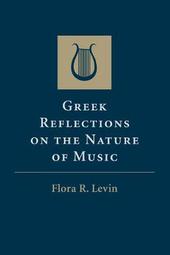
|
Greek Reflections on the Nature of Music
Paperback / softback
Main Details
| Title |
Greek Reflections on the Nature of Music
|
| Authors and Contributors |
By (author) Flora R. Levin
|
| Physical Properties |
| Format:Paperback / softback | | Pages:366 | | Dimensions(mm): Height 230,Width 154 |
|
| Category/Genre | Theory of music and musicology
Western philosophy - Ancient to c 500 |
|---|
| ISBN/Barcode |
9781107459878
|
| Classifications | Dewey:781 |
|---|
| Audience | | Tertiary Education (US: College) | |
|---|
| Illustrations |
10 Line drawings, unspecified
|
|
Publishing Details |
| Publisher |
Cambridge University Press
|
| Imprint |
Cambridge University Press
|
| Publication Date |
6 November 2014 |
| Publication Country |
United Kingdom
|
Description
Flora Levin explores how and why music was so important to the ancient Greeks. She examines the distinctions that they drew between the theory of music as an art ruled by number and the theory wherein number is held to be ruled by the art of music. These perspectives generated more expansive theories, particularly the idea that the cosmos is a mirror-image of music's structural elements and, conversely, that music by virtue of its cosmic elements - time, motion, and the continuum - is itself a mirror-image of the cosmos. These opposing perspectives gave rise to two opposing schools of thought, the Pythagorean and the Aristoxenian. Levin argues that the clash between these two schools could never be reconciled. Her book shows how the Greeks' appreciation of the profundity of music's interconnections with philosophy, mathematics, and logic led to groundbreaking intellectual achievements that no civilisation has ever matched.
Author Biography
Flora Levin is an independent scholar of the classical world. She is the author of two monographs on Nicomachus of Gerasa and has contributed to TAPA, Hermes and The New Grove Dictionary of Music.
Reviews'This volume offers provocative interpretations of Aristoxenian music theory while providing a context in modern mathematics, philosophy, and musicology for the Aristoxenian and other schools of ancient music theory.' Bryn Mawr Classical Review
|